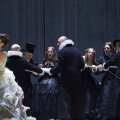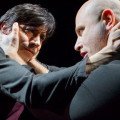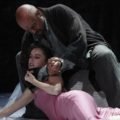The Teatro Carlo Felice responded to the general crisis faced by the Opera Foundations with an opening in the name of quality, exorcising the uncertainty for the future – A review by Davide Annachini
The Teatro Carlo Felice in Genoa responded to the general crisis faced by the Opera Foundations with an opening that seemed to exorcise the sadness of the moment and the uncertainty for the future. They did it in the name of quality, proving that even in difficult times quality should not be lost and still remains possible as long as you make accurate and prudent choices.
The Otello that opened the opera season was a clear evidence of that and the triumphant success it had demonstrated how the public is not willing to disaffect opera but on the contrary is ready to respond with generosity if he is offered a good show. To see a theater packed and enthusiastic, especially during this particular time, was an happy moment for all, arousing hopes for those who really deserve it.
Giuseppe Verdi‘s Otello was undoubtedly a difficult choice: it takes three first class singers and a director with strong shoulders. In Genoa there were all these ingredients and, above all, they joined in perfect harmony.
As largely understood, the role of Otello is a standard and a point of arrival for many singers. It is a vocally hard and insidious part, because you must be able to sing forte but also piano, expressing the many facets of a character who must bend heroic relief from emotional abandonment and dominate the scene. Gregory Kunde was a phenomenal Otello in all these respects: if you think of his previous works, when he began as a bel canto tenor with a light voice, agile and very extensive, now it has miraculously transformed into a lyric tenor pushed by an impressive volume and clarity, still resplendent in a spectacular form for his respectable age, where others would have already stopped singing. Fine musician himself, Kunde is experiencing a second youth with a freshness that allows the unthinkable: singing quite everything. Rarely the Moro part has been played with respect for all its expressive demands, in those fades that Verdi kept in high consideration but that almost nobody can do, as in the dramatic and hypertensive leaps, beginning with the fateful entry, “Esultate!”, absolutely explosive. But, in parallel to the singer, Kunde’s interpretation was always embossed with authority and passionate humanity, making the public love and admire his character.
Genoa’s Otello has to be remembered not only for the triumph of the protagonist: Kunde had found the perfect completion in the lovely and less passive than usual Desdemona played by Maria Agresta, a beautiful emerging young soprano voice. She was also able to splurge on several fronts with a fierce technique, a refined musicianship and expressive authority. Her “Canzone del salce” and particularly the “Ave Maria” prayer (which was entirely performed lying on the ground), made the audience enthusiastic for the purity of her voice and her expressive sensibility. Soon after the pianissimo acute that ends the prayer, the public exploded into a standing ovation, brutally too early but understandably overwhelming.
The Jago played by Carlos Alvarez, one of the finest baritones on the scene, amazed the spectators with his beautiful voice, correct in timbre, amplitude of vibration and rebound. He was a valuable co-star of negativity and darkness, a perfect counterpoint for Otello, as was also pointed out by the director, Davide Livermore.
I found excellent the interpreters in the minor roles – in this we recognize the quality of a theater too – and the Carlo Felice Orchestra and Coro, led by conductor Andrea Battistoni, young but already on the run for a brilliant international career. His reading of Verdi’s opera – a test case even for proven batons – leaved a mark thanks to its safety and soundness but especially for the executive cut. A vivid interpretation, highly dramatic, intense and sensitive, outlining the inexorable task of the tragedy, as well as the intimate crisis of the characters. An interpretation that will obviously be refined with maturity, but already characterized by unquestionable authority.
Director Davide Livermore himself is an emerging artist: his fancy, acuteness and especially his sense for music leave a mark, especially the ability to narrate along with the music, and not in spite of the music. These are qualities I believe should be the first for an opera director. The show, signed by Livermore in collaboration with Giò Forma for set design and Marianna Fracasso for the costumes, imposed itself for the moving spiral platform architecture, which was effective in evoking the island of Cyprus as the isolation of the characters, the deception of Iago as the winding vortex in which the protagonists fall. A vision in dark colors of a gloomy and profound drama, played in perfect symbiosis with the music. A consistent team-working was one of the highlights of the show, co-produced with the Valencian Reina Sofia. An example for other Italian Operas.
Seen at the Teatro Carlo Felice in Genoa, on December 29th 2013
Otello
opera in four acts
libretto Arrigo Boito
music Giuseppe Verdi
conductor Andrea Battistoni
direction and lighting design Davide Livermore
set design Davide Livermore, Giò Forma
costumes Marianna Fracasso, Davide Livermore
assistant to the director Allex Aguilera
setting Palau de Les Arts Reina Sofia – Valencia
Otello Gregory Kunde (Antonello Palombi)
Jago Carlos Alvarez (Sergio Bologna)
Desdemona Maria Agresta (Donata D’Annunzio Lombardi)
Cassio Manuel Pierattelli (Angelo Fiore)
Roderigo Naoyuki Okada
Lodovico Seung Pil Choi
Montano Claudio Ottino
Un Araldo Gian Piero Barattero (Loris Purpura)
Emilia Valeria Sepe (Elena Traversi)
Orchestra del Teatro Carlo Felice, Coro del Teatro Carlo Felice, maestro del Coro Pablo Assante
Coro di Voci Bianche del Teatro Carlo Felice, maestro Gino Tanasini
























